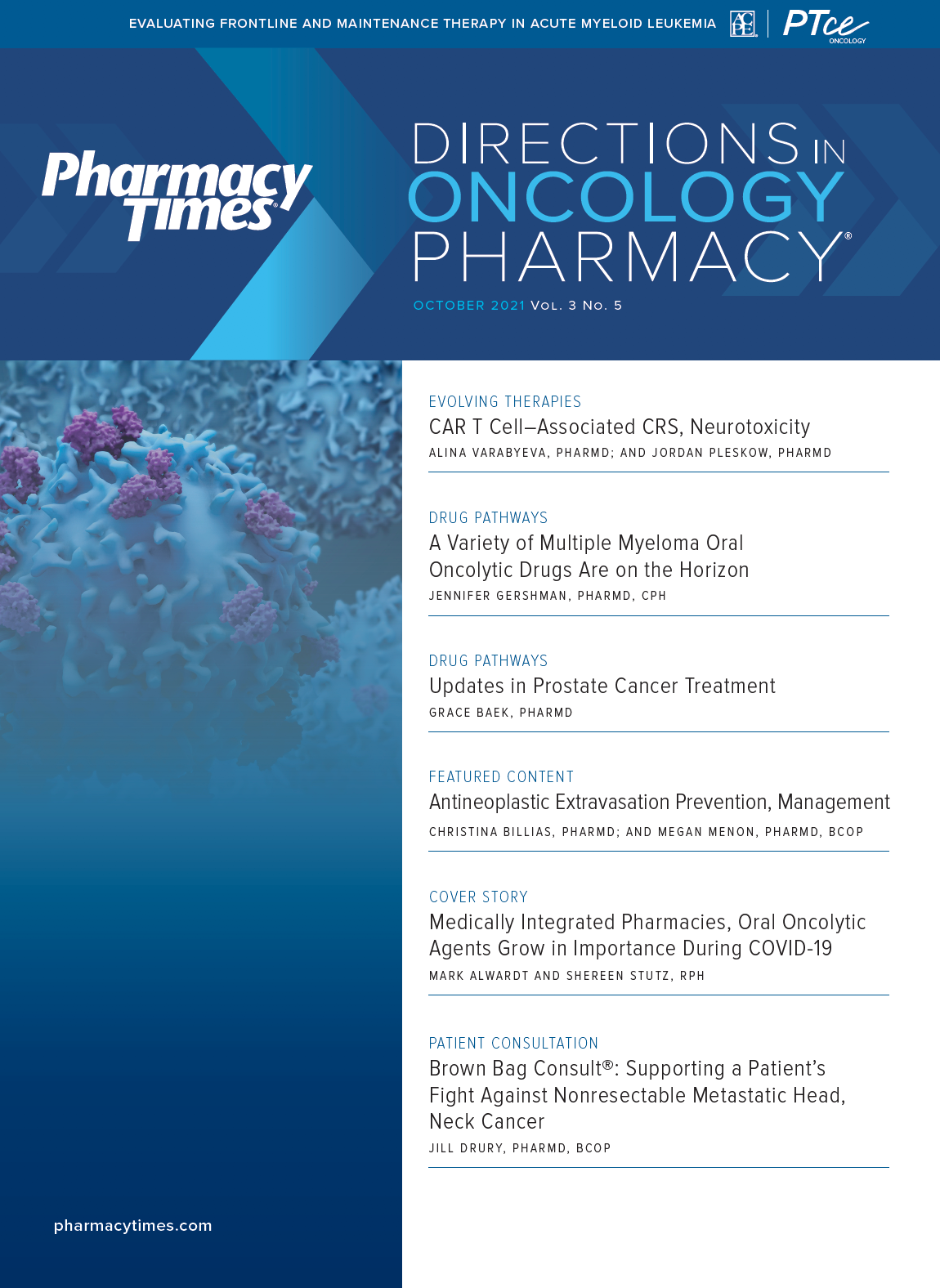The Home Infusion Setting Remains a Critical Option for Cancer Care During the Pandemic
New legislation is set to ensure the availability of home infusions for certain Medicare patients.
The COVID-19 pandemic has put immunocompromised patients, including those immunosuppressed because of cancer or cancer treatment, at much greater risk of SARS-CoV-2 infection and serious complications than the general population.
Consideration of these risk factors can result in treatment delays for patients with cancer, due to the need to weigh the risks of not receiving treatment against possibly becoming infected with SARS-CoV-2.1
Additionally, the risks associated with treatment delay for patients have been further exacerbated by health care institutions being pushed to their limits during the pandemic, leading members of the National Home Infusion Association to recommend legislation ensuring access to home-based health care, including home infusion.2
In August 2021, the Preserving Patient Access to Home Infusion Act was introduced by Sens Mark Warner (D, Virginia) and Tim Scott (R, South Carolina) to assist Medicare patients in maintaining access to home infusion therapies requiring the use of an infusion pump.3
“Medicare’s home infusion therapy benefit provides increased access to care for patients with immune diseases, cancer, serious infections, heart failure, and other conditions that might otherwise force them to receive their care in a more expensive and less convenient hospital or nursing home setting,” said Warner in a prepared statement. “This legislation will ensure that patients in need of home infusion therapy can get the care they need in a more affordable and commonsense way.”3
The evidence available suggests home infusion is safe, effective, and cost saving for patients and providers.4-6 Interviews with clinicians and patients
suggest that individuals favored outpatient or inpatient settings for cancer treatment if they had no previous experience with home treatment; however, physicians reported that they continued to have concerns about safety and increased burden for the clinical care team.7
Home infusion has also been shown to be not only safe and clinically effective, but also to improve patients’ quality of life and reduce health care costs. In a systematic review of articles relating to safety, clinical efficacy, quality of life and satisfaction, and/ or costs of home infusion, investigators concluded that home infusion patients were no more likely to experience drug-related adverse events than patients who received infusions in a medical setting.4
Furthermore, clinical outcomes for patients were as good or better in the home infusion setting; as an example, home infusion patients with hemophilia had a 40% reduction in likelihood of hospitalization for bleeding complications.4
In a meta-analysis of available data, investigators found patients overwhelmingly preferred home infusion. Study participants reported significantly better physical and mental well-being in the home infusion setting, as well as reduced disruption of family life and personal responsibilities. Home infusion was also found to significantly lower costs for patients, with data demonstrating that study participants saved between $1928 and $2974 per treatment course.4
In another review of data on home infusions, investigators observed similar results, with studies showing a decrease in costs associated with home treatment vs hospital or in-clinic treatment. These cost savings were established from both health care payer and patient perspectives. The studies demonstrating cost savings were published from 1981 to 2018, establishing a long-standing, consistent benefit.5
Delivering chemotherapy at home has been deter- mined to be feasible and safe, indicating that home infusion has potential as an alternative to outpatient clinic treatment. In a study of patients who had undergone radical surgery for colon cancer and who were eligible to receive adjuvant treatment with capecitabine and oxaliplatin, investigators randomized patients to receive either 4 treatments at home followed by 3 in an outpatient clinic, or 3 treatments in an outpatient clinic followed by 4 at home.6
During the study, the investigators found that treatment was safe and acceptable in all cases, and participants expressed feeling secure and preferring the reduction in transportation time and waiting time they experienced in the home infusion setting.6
With the pandemic creating treatment hesitancy and barriers to health care access,1,2 efforts like the Preserving Patient Access to Home Infusion Act can offer patients with cancer, as well as other high-risk populations, an opportunity to receive health care in an environment that is safe, comfortable, and less costly for patients and providers.4-6
Although biases may exist among some health care professionals regarding the delivery of cancer care outside a medical setting,7 the available evidence suggests that home infusion is safe and clinically effective, making it a valuable option for cancer care during the COVID-19 pandemic and beyond.4,5
REFERENCES
- Al-Quteimat OM, Amer AM. The impact of the COVID-19 pandemic
on cancer patients. Am J Clin Oncol. 2020;43(6):452-455. doi:10.1097/ COC.0000000000000712 - Letter to the Biden administration. National Home Infusion Association. February 9, 2021. Accessed August 27, 2021. https://www.nhia.org/wp-content/uploads/2020/03/ NHIA-Letter-to-Biden-Administration-1.pdf
- Bipartisan legislation would maintain home infusion access among Medicare beneficiaries. News release. National Home Infusion Association. August 5, 2021. Accessed August 27, 2021. https://www.nhia.org/bipartisan-legislation-would-maintain- home-infusion-access-among-medicare-beneficiaries/
- Polinski JM, Kowal MK, Gagnon M, Brennan TA, Shrank WH. Home infusion: safe, clinically effective, patient preferred, and cost saving. Healthc (Amst). 2017;5(1-2):68-80. doi:10.1016/j.hjdsi.2016.04.004
- Myers J, Eibling A, King J, Smolen H. PMD19 systematic literature review to iden- tify the current state of knowledge regarding home infusion vs medical-setting infusion. Value Health. 2020;23(suppl 1):PMD19. doi:10.1016/j.jval.2020.04.587
- Larsen FO, Christiansen AB, Rishøj A, Nelausen KM, Nielsen DL. Safety and feasibility of home-based chemotherapy. Dan Med J. 2018;65(5):A5482.
- Laughlin AI, Begley MA, Delaney T, et al. Accelerating the delivery of cancer care at home during the Covid-19 pandemic. NEJM Catalyst. July 7, 2021. Accessed September 2, 2021. https://catalyst.nejm.org/doi/full/10.1056/CAT.20.0258

